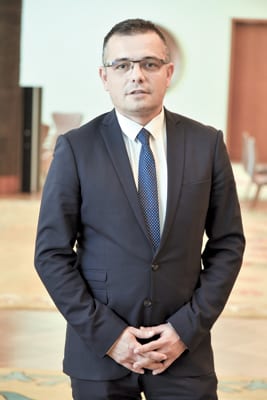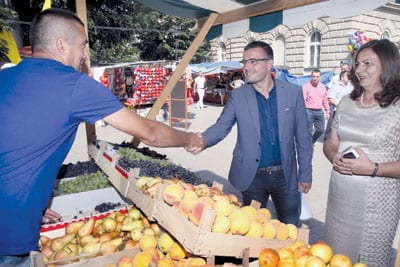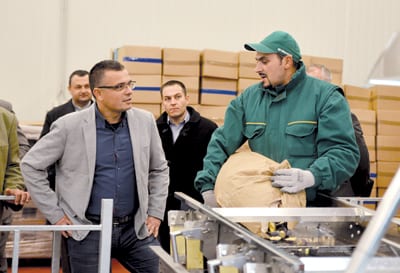The ministry’s aim is to boost the farmers’ competitiveness, reduce their costs and increase their income
The budget allocated to the Ministry of Agriculture and Environmental Protection this year is 8.2 per cent higher than in 2016.
The budget is intended for development and investment and its biggest part, as much as 60 per cent, is earmarked for subsidies in agriculture and rural development.
For the first time in the last 30 years, the Serbian Government and the Ministry of Agriculture and Environmental Protection provide financial support for young farmers.
It’s been eight months since you took office as the Minister for Agriculture and Environmental Protection. There have been some developments since then, among which the 8.2 per cent budget increase for agriculture compared to 2016. Are you happy with the results so far?
I am happy with the results, but there is always room for improvement. I believe in my team and I expect that we will achieve our goals and that they will be visible.
 The budget increase for agriculture and environmental protection is surely an important step considering the budget cuts two years before. This year’s budget for the Ministry of Agriculture and Environmental Protection is 43.8 billion dinars, which is 8.2 % higher than in 2016. The big part of the funds, as much as 60 %, is earmarked for agricultural and rural development subsidies, which means that these funds will be going directly to farms, in various forms.
The budget increase for agriculture and environmental protection is surely an important step considering the budget cuts two years before. This year’s budget for the Ministry of Agriculture and Environmental Protection is 43.8 billion dinars, which is 8.2 % higher than in 2016. The big part of the funds, as much as 60 %, is earmarked for agricultural and rural development subsidies, which means that these funds will be going directly to farms, in various forms.
More importantly, perhaps, the subsidies have increased by some 10 % compared to last year, amounting to 26.3 billion dinars. They include direct payments, support for rural development, credit lines and special subsidies. In my opinion, the increase in subsidies is far more important because they provide direct support to the farms and have direct effects on their productivity.
The deadline for exercising the priority right of lease of about 170,000 hectares of state-owned land for up to 30 years has recently expired. Was there great interest? When will the types of investment be made public?
The government has made available 30 % of state-owned arable land for lease. There is no obligation to lease all acreages in a public tender. Only the ones approved by the Committee in accordance with general and special rules and included by the local government unit in its annual programmes will be leased. We have received 219 applications, which have all been taken into consideration by the Committee. Judging by the number of applications, we can say that the interest was great but also not unexpected by the ministry. The applications are now being reviewed and checked.
This year’s budget for the Ministry of Agriculture and Environmental Protection is 43.8 billion dinars, which is 8.2% higher than in 201
Over the past several months you have travelled across almost the entire Serbia. What are your impressions? Is the interest in agriculture growing and which branches are particularly popular?
The interest in investing in agricultural production is obvious, and I’m very pleased about it. More and more people want to get in touch with the ministry’s services and with me personally. They are all interested in farming and investing in agricultural production.
The ministry has earmarked four times as much money for rural development this year as last. What measures are you planning and what are their objectives?
We wanted a development and investment agriculture budget that would support farming that has a long- or medium-term perspective on the market. The aim of the ministry is to increase the farmers’ competitiveness, cut their costs and increase their income. Bearing this in mind, we have secured the highest increase in funding for rural development (i.e. investment support) of 2.2 billion dinars, which is four times as much as last year.
As regards budget funds for rural development, we have earmarked 3.8 billion dinars or 25 % more than last year. About 50 % of these funds have been earmarked for subsidies to help boost competitiveness, which is 2.4 times more than in 2015.
 This group of measures aims to improve the farms’ competitiveness by investing in primary production and processing, including investment in new orchards, procurement of new tractors, building and fitting out new facilities and procurement of equipment for the processing of meat, milk, fruit, vegetables and grapes. These measures also include support for risk management, which encourages crop and animal insurance from the potential loss of income.
This group of measures aims to improve the farms’ competitiveness by investing in primary production and processing, including investment in new orchards, procurement of new tractors, building and fitting out new facilities and procurement of equipment for the processing of meat, milk, fruit, vegetables and grapes. These measures also include support for risk management, which encourages crop and animal insurance from the potential loss of income.
Rural development measures also include subsidies for the enhancement and conservation of the environment and natural resources, such as subsidies for organic farming, conservation of genetic resources, support for agro-environmental measures, good agricultural practices and other environmental protection and conservation measures.
In addition, subsidies for income diversification and improving the quality of life in rural areas will be implemented under the rural development policy, support for non-agricultural activities, support for young people in rural areas, boosting competitiveness by adding value, introducing food quality certification, farming organic products and products with a geographical indication.
Other rural development measures include subsidies for the preparation and implementation of local rural development strategies and for improving learning and transfer of knowledge.
Young farmers are also in focus. Do you have any information concerning how many young people are interested in returning to and staying in the farms? What’s been stopping them to do that?
Our rural areas are characterised by a decrease in population in general, increase in elderly population, daily migrations, unemployment among young people and unsatisfactory offer of quality jobs. This is why for the first time over the past 30 years the Serbian Government and the Ministry of Agriculture and Environmental protection have decided to financially support young farmers.
After the adoption of the Rulebook on subsidies for income diversification and improving the quality of life of young farmers in rural areas, there’s been a visible increase in the Serbian young population’s interest. Two out of three calls to the ministry’s Info Centre concern this measure. Young commercial family farm operators (of up to 40 years of age) and young entrepreneurs, in particular, are interested in investing in enhancing primary crop and husbandry production, development and improvement of milk, fruit and vegetable production and in the preparation of agricultural products for the market.
Investment in preparing products for sale and in the processing that will add value to products will have an advantage when ranking applications, especially if they come from underdeveloped areas with adverse farming conditions, young farmers or potential beneficiaries with appropriate agricultural education. The maximum subsidy per beneficiary will be 1,200,000.00 dinars.
The aim of the ministry is to increase the farmers’ competitiveness, cut their costs and increase their income. Bearing this in mind, we have secured the highest increase in funding for rural development of 2.2 billion dinars, which is four times as much as last year.
There is an unprecedented interest in the procurement of new tractors. Please remind us of the total amount earmarked for it. Do you think that new mechanisation can help boost agricultural production?
In accordance with the Regulation on the Disbursement of Agricultural and Rural Development Subsidies in 2017, a total sum of 210,500,000.00 dinars has been earmarked for the procurement of new tractors of maximum 100 kW, used in fruit, grapes and vegetable growing.
Considering that the average age of agricultural machinery in Serbia is about twenty years and that the new machinery reduces the costs of fuel, motor oil, repair and maintenance, increases productivity and reduces environmental pollution, the ministry has envisaged a refund of 50 % of the realised acceptable investment (tractor). Farmers living in areas with adverse farming conditions will get 65 %. The maximum amount that a beneficiary can get is 1,800,000.00 dinars.
You reiterate that we should focus on producing products with added value, which can generate much higher earnings than selling raw materials. Do you see any progress in the development of the processing industry?
Yes. There has been a progress and we expect that the call for bids for arable land lease will help increase investment in the processing industry and products with added value. We are making great efforts and are committed to the development of the processing industry. I insist that this is one of the ways for us to put the surplus of farm products on the market. As a result, we are developing special credit lines.
The aim of the subsidies for the procurement of tractors, for investors leasing state-owned arable land for up to 30 years who have involved animal husbandry, processing industry or renewable sources of energy, is to boost self-development rather than sell good but cheap goods. Our objective is an investment in adding value to agricultural products so that both the producers and the country can benefit from it.
The Chinese Minister for Agriculture Han Changfu has recently visited Serbia for the first time. As a result, Serbia and China have signed a Memorandum of Cooperation in agriculture. Have any steps been made to welcome Chinese investors and increase export?
The Memorandum of Cooperation concerns the provision of guarantees for the safety of foods intended for import and export. We have signed it with the Chinese General Administration of Quality Control, Inspection and Quarantine. This is an important document as it is a basis for the smooth placement of Serbian products on the Chinese market.
 The importance of the visit by Minister ZHI Shuping, who heads the General Administration, is particularly important considering that countries with much bigger capacity and stronger markets are still waiting for him to come over, but Serbia was the one that had the privilege to welcome him and indirect talks remove all obstacles to the smooth export of our products.
The importance of the visit by Minister ZHI Shuping, who heads the General Administration, is particularly important considering that countries with much bigger capacity and stronger markets are still waiting for him to come over, but Serbia was the one that had the privilege to welcome him and indirect talks remove all obstacles to the smooth export of our products.
Political relations between Serbia and China are at their peak, better than they have ever been. Such good political relations are naturally followed by the development of the economy and consequently the development of agriculture. We are not going to miss this chance to enhance our economic relations with China.
Serbia already exports agricultural products to the gigantic Chinese market but in small quantities. Through serious, continuous and above all excellent communication with the Chinese government and businesses we want the Chinese investors to come to Serbia and open processing plants because agriculture cannot function without the processing industry.
Our rural areas are characterised by decrease in population in general, increase in elderly population, daily migrations, unemployment among young people and unsatisfactory offer of quality jobs. This is why for the first time over the past 30 years the Serbian Government and the Ministry of Agriculture and Environmental protection have decided to financially support young farmers.
Serbia has considerable potential to increase export to Russia, in particular of beef and pork. What is the situation there?
Serbian companies can benefit from foreign trade agreements with the Russian Federation. The number of companies entering the certification process is increasing. This trend should continue in the future so that their products and services can compete on and concur such a demanding market.
To keep the pace with the times and the competition, i.e. to impose ourselves and survive in the existing and emerging markets, we need to invest constantly in breeding technologies that are used in the countries with developed animal husbandry, increase the quality of the genetic material (enhance breed composition), improve the selection processes and marketing.
Farm consolidation and partnership relations between the farmers involved in the production and those involved processing are also required. Small farmers need to get involved in specific types of products such as of products with a geographical indication, to focus on products of higher production stage and added value etc.
Our market is part of the great European market and any change that happens there affects our producers. Selling our products on foreign markets is not possible without competitive prices and a production scope big enough to meet the demand.
You say that Serbia’s chance is in organic farming and that it could compete with Slovenia and Austria in the future. How much have the subsidies increased for organic farming compared to conventional farming?
In accordance with the Regulation on the Disbursement of Agricultural and Rural Development Subsidies, this year a total of 90 million dinars have been allocated for organic farming. Last year subsidies for organic crop growing were 40 % higher compared to the subsidies for conventional farming. This year the subsidies are 70 % higher and they include payments per hectare and allowance for fertilisers and soil conditioners that are allowed in organic farming. The novelty is that the list of subsidy beneficiaries has been increased and it now includes farmers from cooperatives who are covered by group certification.
As regards subsidies for organic animal husbandry, they are 40 % higher than subsidies for conventional farming and include payment of premiums for milk, heifer, lamb, kid and pig fattening, dairy and beef cows, quality parent breeders, beehives and production of fish for human consumption.
Organic farmers can also get a 50 % refund for part of the costs of control and certification, and those farming in adverse conditions can get a 65 % refund.